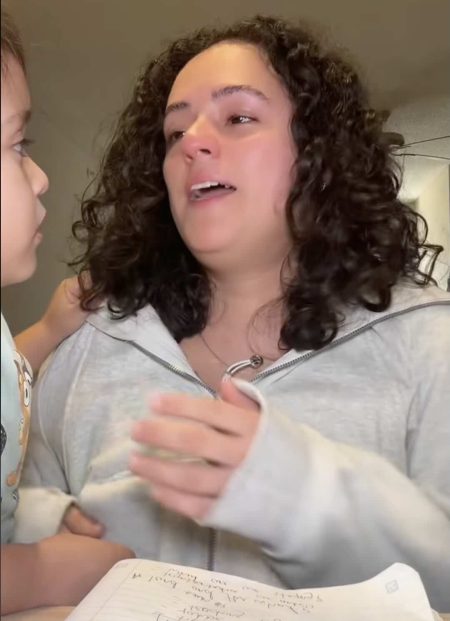DACA Mom Chooses Self-Deportation to Keep Her Daughters Safe

In a deeply emotional and heartbreaking video, a woman named Q shares her journey of making the unimaginable choice to leave the only home she has ever known. Brought to the United States from Mexico at the age of seven, Q is a recipient of DACA (Deferred Action for Childhood Arrivals), a status that has allowed her to work and live in the U.S. without fear of immediate deportation—until now. With growing concerns about potential ICE enforcement, she has made the painful decision to self-deport to Mexico with her three daughters, all of whom are U.S. citizens.

“I Cannot Risk Being Separated from My Daughters”
For Q, the fear of deportation is not an abstract threat—it is a real and immediate possibility. As she speaks through tears, she describes the deep anxiety that keeps her up at night. “It only takes one interaction with one racist ICE officer,” she says. Despite having DACA, she knows that policies can shift at any time, and there is no guarantee that she would even be sent back to Mexico. “Guantanamo?” she asks, the uncertainty hanging in the air. The fear of being forcibly separated from her daughters, trapped in an immigration system with no clear path home, is too much to bear.
Her youngest daughter, a toddler no older than three, sits beside her throughout the video—completely unaware of the gravity of the moment. She smiles and plays, innocent and happy, while her mother breaks down in tears. The contrast is gut-wrenching. This little girl has no idea that her entire world is about to change.
“My daughters are American citizens. They were born here. This is their home,” she says through tears. Despite their citizenship, she knows that if she is deported, she will have to take them with her.
“I cannot leave them behind. I am their mother. I will not risk them ending up in the foster system.”
Her daughters have the rights and privileges of U.S. citizens, yet their futures are now uncertain because their mother, the only home they’ve ever truly known, is being forced into exile. This reality highlights the heartbreaking contradictions of the immigration system—where children who are legally entitled to remain in the country must uproot their lives to stay with their parents.
The Complex Reality of Self-Deportation
Q has begun to meticulously plan for the life-altering move. She lists the steps she must take:
🛂 Obtaining passports for her daughters.
🪪 Navigating the Mexican consulate to get identification for herself.
🇲🇽 Choosing a city in Mexico to relocate to.
💵 Calculating how much money she will need to survive while securing work.
📝 Researching homeschooling options since she no longer feels safe taking her children to school.
📦 Determining whether they will drive or fly and how they will transport their belongings.
These are not the concerns of someone seeking a new adventure abroad—these are the worries of a mother forced into exile, desperately trying to ensure her children’s safety and stability in an unfamiliar country.
“Do I Want to Leave? No.”
Though Q was born in Mexico, she is, in every sense, American. She has lived in the U.S. for most of her life, and she does not speak fluent Spanish. She worries about how she will navigate life in a country that feels foreign to her, one where her daughters—who do not speak Spanish at all—will have to start over.
“I feel like I’ve let my mother down,” she confesses, acknowledging the enormous sacrifice her own mother made to bring her to the U.S. in pursuit of a better life. Now, she faces the devastating reality that this “better life” has failed to provide her with lasting security.
The Heartbreak of Motherhood and the U.S. Immigration System
Watching Q’s video as a mother is nothing short of devastating. The rawness of her pain, the way she holds back sobs while listing logistical concerns, and the way her toddler blissfully plays beside her—it is a haunting reminder of the broken immigration system that places families in impossible situations.
For many, immigration debates remain a political talking point, an abstract issue reduced to numbers and policy discussions. But for Q, this is her life. This is the life of her children. This is the story of countless others who live in fear, torn between staying in the only country they have ever known and leaving before their families are forcibly ripped apart.
As she concludes the video, she promises to document the process so that others can follow her journey of self-deportation. But the unspoken question lingers: Why should she have to do this at all?
TikTok Video Source: https://www.tiktok.com/@q_vasquez/video/7465790750639263018





Responses